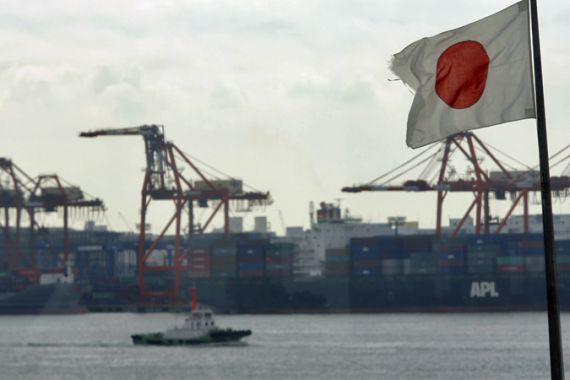Not quite what it seems: Japan’s strong growth masks problems
Japan’s economy grew faster than expected in the first quarter, but spending and exports fell sharply.

Better-than-expected economic growth in Japan in the first quarter of this year could give Prime Minister Shinzo Abe enough political cover to push through a controversial proposal to hike the country’s sales tax, analysts say.
But beneath the rosy headline figure lie some troubling statistics.
Keep reading
list of 4 itemsIndia-Iran port deal: A gateway to Central Asia or a geostrategic headache?
India’s income inequality widens, should wealth be redistributed?
Facebook, Instagram face EU scrutiny over addictive effects on children
Japan’s gross domestic product grew by 2.1 percent in the first three months of 2019, compared to the same period last year, according to the government’s preliminary estimate. Analysts had predicted a slight contraction in the economy after GDP grew by 1.6 percent in the October-to-December quarter.
The government wants to increase the sales tax from eight percent to 10 percent – a politically charged issue.
“The data is certainly much stronger than expected and will help the government to reiterate the success of Mr. Abe’s signature economic policy of Abenomics. This is crucial for him as he prepares for the upper house elections in July,” Waqas Adenwala, an analyst at The Economist Intelligence Unit, told Al Jazeera.
But spending by both individuals and companies fell. Exports declined 2.4 percent from the previous quarter and recorded their biggest fall since 2015. Imports fell by 4.6 percent.
“The quarter recorded a fall in Japan’s imports, especially petroleum products. By the beginning of the year, nine nuclear reactors were fully operational in Japan. This has helped Japan to increase its energy self-sufficiency and be less reliant on imported fuel for power generation,” said Adenwala.
“Exports fell during the quarter, and given how export-oriented Japan’s economy is, this is a major concern for some of the country’s biggest manufacturers.”
Adenwala feels that higher investment by the government has been the key driver of growth.
“The government introduced another supplementary budget at the start of the year and as part of precautionary measures against natural disasters, especially earthquakes, it ramped up spending on infrastructure projects by an additional 1 trillion yen ($9.1bn),” said Adenwala.
The headline number, positive as it may seem, may not be a true indicator of the real state of the Japanese economy, warned Nomura, a Japanese bank. In a note, Nomura’s Chief Japan economist Takashi Miwa said the rise in GDP growth may be the result of a sharp drop in imports. The drop in imports means Japan is spending less abroad, which keeps more money at home. Without counting those savings, said Miwa, the economy likely contracted.
“We think the results suggest sharp deterioration in the actual economy,” said Miwa.
Still, he says the overall Japanese economy is on the right track, with “most monthly indicators since April” pointing towards recovery and showing that any weakening of economic activity is not likely to continue into the current quarter.
“The overall economy does not look likely to fall into a recession,” said Miwa.
Sales tax push?
The latest numbers might mean that Abe’s government may finally be able to move forward with an increase in the sales tax that has been planned for October.
“We think the government is unlikely to start considering policies to counteract a downturn, such as delaying the planned hike to the consumption tax rate,” said Miwa. Others concur.
![The stronger-than-expected economic growth figure may help the government push through a sales tax hike [Getty Images]](/wp-content/uploads/2015/02/e256c685ca5948dc9991ba82dd5c88c1_18.jpeg)
“The better-than-expected GDP data will reaffirm the government’s stance,” said Adenwala.
The Japanese government has already made plans on how to spend the higher tax revenue that an increase in the sales tax would generate. It has plans to boost social security services and to spend more than 2 trillion yen ($18.2bn) to mitigate the impact of the tax rise, said Adenwala.
Any further delays to the tax increase would require a special supplementary budget.
Japan last increased the sales tax from five percent to eight percent in April 2014, a move that led to a sharp economic slowdown.
The latest growth figures also set the backdrop for a summit between US President Donald Trump and Abe starting on Friday and another planned meeting at the G20 Summit in Osaka next month.
“The upcoming Trump-Abe summit will be primarily focused on their bilateral trade agreement. The key points of concern will be how the US will try to negotiate a better deal for its agricultural products while trying to reduce its imports of automotives from Japan,” said Adenwala. “For Japan, this will eventually mean a shift in focus of reconsidering their supply chains, which include China as a production hub.”